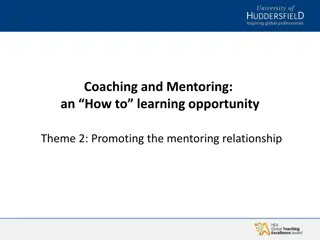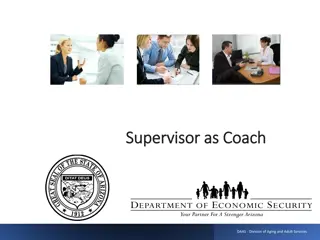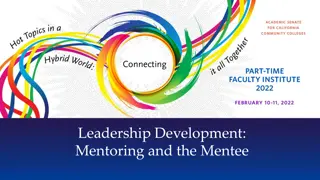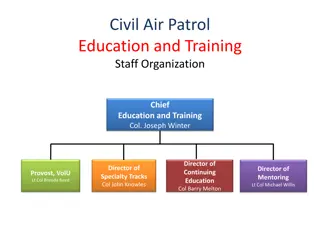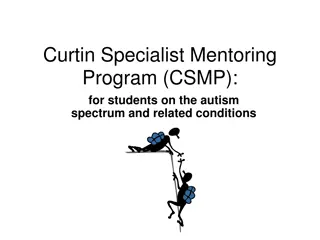Enhancing Professional Success Through Responsible Mentoring
Explore the importance of mentoring in promoting education and training for science professionals, fostering responsible research conduct, and addressing ethical issues in mentor-trainee relationships. Discover the benefits of making mentoring a priority, including increased research productivity and career advancement. Learn how effective mentoring leads to greater success for both mentors and mentees, and the importance of upholding ethical standards in academia.
Download Presentation

Please find below an Image/Link to download the presentation.
The content on the website is provided AS IS for your information and personal use only. It may not be sold, licensed, or shared on other websites without obtaining consent from the author. Download presentation by click this link. If you encounter any issues during the download, it is possible that the publisher has removed the file from their server.
E N D
Presentation Transcript
1 RESPONSIBLE MENTORING
3 Learning Objectives Recognize the significance of mentoring in promoting the education and training of science professionals Recognize the role of mentoring in teaching responsible conduct of research Identify roles and responsibilities of mentors Examine some of ethical issues arising in the mentor- trainee relationship and their causes Reflect on one's own behavior and attitudes regarding mentoring.
4 Should researchers make mentoring a priority? Professional success = research productivity, grants, national and international reputation. Why invest time, energy and resources in mentoring undergraduate, graduate and/or postdoctoral students?
5 What s in it for you? engage the curiosities and energies of fresh minds. prepare the next generation of intellectual leaders in the disciplines and in society. enjoy the personal and professional satisfaction inherent in mentoring relationships. keep abreast of new research questions, knowledge, paradigms, and techniques. cultivate collaborators for current or future projects. identify and train graduate assistants whose work will be critical to your research or teaching.
6 Your success is tied to the success of your trainees Studies indicate that graduate students who receive effective mentoring demonstrate: More research activity, conference presentations, pre- doctoral publications, and grant writing. Greater academic success in persisting in graduate school, achieving shorter time to degree, and performing better in academic coursework. Greater professional success with greater chances of securing a tenure-track position or greater career advancement potential if seeking leadership positions outside of the university.
7 Being a good mentor will contribute to your professional success Increase scholarly productivity Assure the quality of scholarly work Build your professional reputation and the reputation of your department and university
8 Pressure to succeed Pressure to succeed can undermine the integrity of the academic process. Examples abound I want to emphasize that part of a mentor s responsibility is to instill an understanding of standards of conduct and to display and demand ethical behavior.
9 Training of responsible conduct of research It is a means to safeguard the integrity of scientific and academic work. It is our obligation to preserve disciplinary and public trust in the truth of scientific/academic contributions
10 Is Compliance Training Enough? Compliance Offices identify standards and expect that knowing the standards will enable people to comply with them. However The standards may not address principles or dimensions of ethical decision making required for compliance which can lead to misinterpretation and unethical behavior. Many important roles and activities of scientists are not observed by students (e.g., peer review, conflict of interest or building collaborations). Compliance training does not address community standards which play a role in determining what are acceptable/unacceptable actions.
11 What mentors should do? Assume responsibility to properly and appropriately train. Impart an understanding of responsible research practices. Routinely check and coach to make sure the trainee develops into a responsible researcher. Quality control in the lab may be delegated to others but is ultimately the mentor's responsibility. Take time to: Review lab notebooks and data Read manuscripts to assure accuracy and proper credit Meet with trainees regularly about their work
12 What is ethical mentoring? Mentoring involves taking the responsibility to guide and assist students on their paths toward success and fulfillment of their academic and professional aspirations. Ethical mentoring occurs when you faithfully execute that responsibility. Ethical mentoring can be in part self-serving, but it is also focused on the interests of the students.
13 Responsibilities of mentors advisors, who have career experience and share their knowledge masters, who serve as employers to graduate student apprentices advocates, who speak up for and protect the interests of the student supporters, who give emotional and moral encouragement tutors, who provide specific feedback on performance sponsors, who are sources of information and opportunities models of identity, who serve as academic role models From, Zelditch, 1990, p. 11
14 Disciplinary guide and socializing agent Identify good questions and important topics What students need to learn and accomplish to achieve success Highlight political, economic, and social elements of interacting within the academic community Model and encourage collegiality Model skills related to listening, expressing ideas, Promote skills needed administration and planning, and budget management Guide ethical development
15 Principle 1: Good mentoring serves the interest of the trainee Set explicit and reasonable expectations for the mentor and the trainee, and develop strategies to make the relationship as productive and mutually satisfying as possible Establish concrete deadlines and concrete milestones in each area of the student s academic activities Schedule regular meetings Deal with issues of authorship and intellectual property at the start of a project Discuss any delay in publication of such as may occur with industry-funded research or research leading to patents
16 Principle 2: Be available Schedule regular meeting times and keep the schedule! Agree in advance of each regularly scheduled meeting what will be discussed or at least who will identify what will be discussed Write down and share any decisions reached in the meeting Interact outside of meeting times (e.g., establish open door policy, chat in lab, hallway, over lunch, at a bar etc. .
17 Principle 3: Encourage students to seek multiple mentors It is a rare individual who can serve in all the roles that mentors can and should play. masters advocates supporters tutors sponsors models of identity multiple mentoring systems allow a division of labor that make up for differences in style, skills, and availability.
18 Principle 4: Task trainees according to their levels of experience and skills The role of the mentor is to provide advice, help, and encouragement as well as to educate and prepare trainee to become an independent scholar. Examine handout
19 Principle 5: Practice what you preach (be a good example) Be consistent and hold yourself to the standards you expect your students to embrace. Don t violate practices of data management, data collection and analysis, publication, etc. If you do your student will likely Do the same things Think you are a hypocrite Lose respect for you
20 Troubled mentoring relationships Problems between mentors and trainees occur when one of them is not getting what is expected from the relationship. Solution: Communication early on to make mentor and trainee expectations explicit establish standard operating procedures (e.g. meeting times, data collection and interpretation, establishing authorship, data ownership, etc.,) set expectations regarding time spent in the lab or on projects convey deadlines or deliverables Establish criteria that will be used for judging performance and letters of recommendation It is valuable to create a written record of these agreements
21 Root causes of ethically suspect mentoring Result of the inherent imbalance of power in the mentor-trainee relationship. Mentors have more knowledge, experience, and status, and in most cases Mentors are in a position of authority over the trainee Mentors control support and advocacy student needs and fears to lose
22 Tor-mentoring--exploitation A mentor can use the inequality of power to exploit the trainee : refusing to give proper credit for the trainee's contributions insisting on be included as author on paper when didn t contribute to the writing seeking to obtain personal (baby sit, mow yard) or even sexual favors. requiring student to devote time exclusively to mentor's research at expense of student s studies, personal research, health or well-being. influencing choice of student s research project based solely economic benefits the mentor will receive .
23 Tor-mentoring- toxic mentoring Mentors behave unethically when they withhold mentoring or distort advice and guidance: Disengage and fail to serve as champion, sponsor, or protector Compete with student rather than guide and support Ignore, neglect, provide scant feedback, communicate inadequately Give extremely harsh criticism
24 Where does the responsibility of the supervisor end and that of the trainee begin? How much does a faculty member "owe" to the mentoring of the trainee as opposed to what they owe themselves and their other academic duties? What are the trainee s responsibilities to the mentor? Whose responsibility is it to protect students from poor advisers?
25 End
26 Responsibilities of mentors . Taking an active role in helping to train the next generation of scientists should not be optional - it should be part of the definition of a scientist. For this reason, the enterprise of science depends on effective communication not just about the science but about the practice of science, standards of conduct, and ethical and social responsibility
27 Mentoring and Responsible Conduct Mentoring should go beyond compliance training. Mentors can identify disciplinary-based ethical challenges, dilemmas and standards of practice. Mentors can discuss areas of ethical concern that students might otherwise not witness (authorship, conflict of interest, peer review). Mentors reinforce through words and deeds the importance of adherence to standards of conduct.
28 Mentors socialize trainees Highlight political, economic, and social elements of interacting within the academic community Model and encourage collegiality Develop skills for teaching, communication, working in teams, leadership Model skills related to listening, expressing ideas, Promote skills needed administration and planning, and budget management Guide ethical development
29 Allow for differences in personalities Some mentors are uncomfortable with offering advice or initiating discussions unless first asked by a trainee, and other mentors provide advice without any clear indication that help would be welcomed. Some trainees require minimum of nurturing or guidance and, frequent and probing discussion initiated by a mentor may be perceived as invasive and micro-managerial. Other trainees may want close monitoring and frequent feedback, both positive and negative.
30 How much time will being available cost? Surprisingly little. Two skills or habits make efficient use of your time (Columbia Center for Teaching) Careful listening: The goal is to open clear communication and promote feelings of support, encouragement and understanding Listen to what trainee is trying to tell you without first evaluating. Try to focus on the nuances of word emphasis and body language. Ask a few well-placed questions to clarify Keep in touch: Regularly communicating with your trainees. a few minutes to your trainees every other day or so. Reach out to them if they don t reach out to you These short exchanges can help one stay aware of what is going on and anticipate problems before they grow
31 Past 30 years and training in RCR Beginning in the late 80 s various professional organizations began to call attention to the importance of mentoring in the responsible conduct of research. Eg., 1992, a Panel on Scientific Responsibility and the Conduct of Research concluded that "Research mentors ... are responsible for defining, explaining, exemplifying, and requiring adherence to the value systems of their institutions.
32 Mentors serve as advocates Step forward and defend or advocate for the trainee. e.g., Dissertation or thesis proposal: A member of the review panel for the exam has a reputation for demanding perfection from students and keeps sending the essay back. Other more common examples include securing access to departmental resources, supporting students applications for employment, encouraging other faculty or colleagues to assist or guide
33 Three areas where mentors must play a role Skills development consultant Disciplinary guide and socializing agent Career Consultant
34 Skills development consultant Technical skills Model and teach skills related to listening, expressing ideas Team-oriented skills Leadership skills
35 Career consultant Mentors understand trainees short-term and longer-term aspirations and help plot a course to meet them. Requires knowledge, planning, resources, flexibility and adaptability. A mentor understands that a trainee s aspirations may change over time. A mentor understands and accepts that a trainees aspirations may not be the same as his or her own. Connects trainees with those who can help them reach their goals
36 Training of responsible conduct of research It is a means to safeguard the integrity of scientific and academic work. It provides learning experiences that safeguard against misconduct It is a critical piece in meeting our obligation to protect the integrity of our work and the body of knowledge to which our work contributes It preserves disciplinary and public trust in the truth of scientific/academic contributions
37 Principle 6: Do not assume understanding-- especially of RCR It is important in matters related to the conduct of research that you take the time to highlight discuss acceptable practices in your discipline They may not be obvious to less experienced people They may not be obvious to people from a different cultural background
38 Summary- What mentors should do Assume responsibility to properly and appropriately train. Foster intellectual and professional development. Impart an understanding of responsible research practices. Routinely check and coach to make sure the trainee develops into a responsible researcher. Quality control in the lab may be delegated to others but is ultimately the mentor's responsibility. Take time to: Review lab notebooks and data Read manuscripts to assure accuracy and proper credit Meet with trainees regularly about their work



